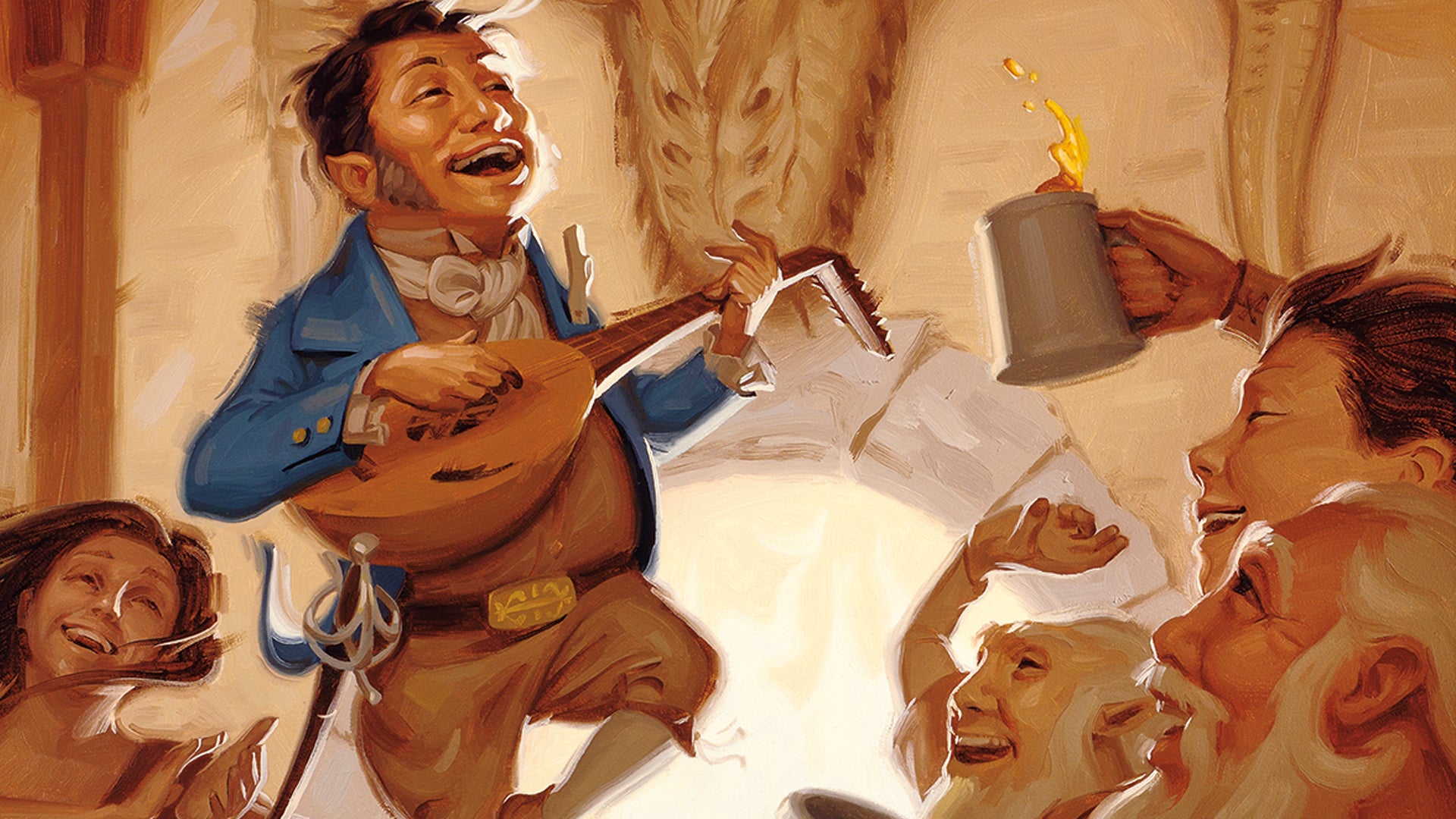Do You Have to Have a Short Rest After Using Acantrip to Use It Again
Dungeons & Dragons 5E is a complicated game. Not many other tabletop RPGs require a primal rulebook, two further compendiums and a scattering of supplements and designer updates to exist current, nor bring with them a few decades' worth of previous editions that have moved the goalposts since.
It'southward as natural every bit a one or a 20, then, that some of the roleplaying game'southward trickier corners become forgotten between rollicking adventures; whether that'south the verbal unladen conveying chapters of your average commoner (300 pounds, impressively) or how to roll an attack (a d20? Are you lot certain?)
So, to help spare your blushes, we've delved into the Forgotten Rules universe (next door to the D&D setting of the Forgotten Realms) to dig out the peak ten Dungeons & Dragons 5E laws you may accept un-remembered.
A word of warning: your mileage may vary, and your dungeon master may well accept their own ways of litigating some of these forgotten rules in clever, elegant or hilarious ways. And in any case, the Rule of Cool may win out. So always bank check in with them and your group before 'rules lawyering'.
Adulterous death - critically
When your character drops to zero striking points - and their merry trip the light fantastic with Death begins - you start rolling death saving throws. Iii failures (below a 10 on a d20, with no modifiers) and they're chocolate-brown bread; three successes (a ten or in a higher place), and they are 'stabilised', unconscious but on 0hp. Like a actually nasty hangover.
Rolling a natural one on that check means two failures, pregnant death is only one sub-par dice chuck abroad. Merely a natural xx on a death saving curlicue ways they gain one hitting point and spring back into activity equally if nothing happened - no matter what else they rolled.
Jack of All Trades… including initiative
This is a very specific rule but one that your bard thespian will be overjoyed to hear: we already know that, starting at second level, they tin can add half their proficiency bonus, rounded down, to whatsoever ability check made that does not already include their proficiency bonus.
Most bards volition add together this bonus to their usual skill checks - athletics, insight, animal handling and the like - with glee. But they can likewise add together their Jack of All Trades bonus to their initiative gyre at the starting time of combat, adding a +1 at second level (and going up from there).

Ranged problems
Ranged players, nosotros're giving you a two-for-i special here. First: if you are shooting and any enemy is next to y'all (within 5ft), you brand those attacks with disadvantage, no thing who you are targeting. Even if you feel like you lot're channeling John Wick, bogies on your six (baddies behind you) will put you off that perfect shot.
At that place's more bad news: second, if you desire to ranged attack past some other creature - whether friend or enemy - and then your target will count as beingness in half encompass and gain a +2 bonus to their Ac and dexterity saving throws. Wanted-style bullet or arrow-curving is out too, I'm agape. (You can work out Ac in this Dungeons & Dragons graphic symbol creation guide)
Doubling upward - effects and hits points
This is a quick and easy ane, and is more of a clarification of the rules as they exist: if you want to combine the furnishings of ii spells or abilities that have an consequence, positive or negative, on the target, then only the stronger 1 volition have an effect.
This also applies to temporary hit points: y'all can't stack up your brusk-term meatiness, and can only cull the larger value of your electric current value, or the newly gained temporary health puddle..
Powerlifting and you lot
Carrying capacity is not the sexiest rule in D&D 5E, every bit it brings to life that function of other tabletop or video game RPGs that everyone loves to hate: inventory management.
But there'south an important part to deport in mind when information technology comes to incredible feats of strength. Your character'due south carrying chapters (in pounds) is their strength score times 15 (or by half dozen.8 if y'all prefer the metric system). You can push button, drag or lift up to twice that value at your full motion speed; if you try to drag or push more, you can only move at a speed of v feet. These values double for creatures in each size category to a higher place medium, and half for each category smaller.
Important? Perhaps non, but it can exist devastating in combination with...

Exhausting your options
Burnout is an often-ignored ruleset in Dungeons & Dragons 5E simply can exist a fantastic way to add together higher stakes to a wilderness mission, or added peril to a monster's attacks or an ancient dungeon'southward defenses.
Characters can proceeds a level of exhaustion if they are exposed to the elements, start starving or carry way besides much for style too long. DMs unremarkably call for a saving throw of the appropriate type, with a failure gaining a level of exhaustion. This starts at disadvantage on power checks at level i, progressing through speed halved, and then disadvantage on attack rolls and saving throws, and so maximum hit points halved, earlier your speed is reduced to zero and, at stage six, expiry. These effects are cumulative, too, and are hard to shake off: a long remainder will reduce your exhaustion level by one, simply just if you take access to food and beverage.
Spell Components - not but a shopping list
Most DMs lack the time or bookkeeping skills to stay entirely on top of fabric spell components, and rightly so: who wants to send their party on an ballsy shopping quest to larn an adder's stomach (worth eight aureate) just so their ranger tin cast Melf's Acid Arrow?
But spell components can add an interesting element to your spellcasting and roleplaying, particularly when considering the verbal and somatic elements (proverb words and making elaborate magician gestures, respectively). And many status weather condition, spells or unfortunate circumstances volition brand one of the two impossible - meaning players need to be more artistic about how they cast them, and DMs more devious in how they can restrict spell-slinging in their adjacent come across.
Which leads u.s. nicely into…

Concentration, concentration, concentration
Spell concentration is part of many of the nigh devastating, ongoing spells, and is a rule that represents your pulley maintaining their cool while channeling mass destruction/healing/polymorphing your party'south gnome into an developed red dragon.
Much of the state is misunderstood, though: y'all tin movement and attack while normal while concentrating, for example. The status only breaks if you cast some other spell that requires concentration, you fail a con salve when taking damage (DC of 10 or half the impairment you accept, whichever is higher), you are incapacitated or dice, or sure environmental furnishings force another con save (like a wave hitting the send you're on, or your character'south children mobbing them).
But wait! There's more:
Become set up… concentrate!
Readying an action is a great way to hold an attack, spell or cool flip for a vital moment in a combat. But did you know that readying a spell requires y'all to maintain concentration for the elapsing?
Well, it does! And then if you lot're charging upward your Fireball and your DM sends a horde of goblins your way to interrupt, you better curl well while they wail on your face. Else your cleverly-delayed pyrotechnics will end up doing very little.
Machine-gun spells
For the near part, players can only take a unmarried action on each circular of gainsay, which usually translates to a single assault, spell or try at pulling a lever. But some derisive spells, such every bit Shield or Hunter'southward Mark, accept a cast time of a bonus action.
But before your greedy wizard eyes calorie-free up, at that place'southward an important rule to remember: if you lot utilize a spell with a casting time of ane bonus activity, you lot can't cast another spell during the aforementioned turn, except for a cantrip with a casting time of one activity. However, if y'all were still interested in playing a magician, you tin learn to create ane with this guide to the sorcerer class.
So, Misty Step into Firebolt? Fine. Misty Step into Magic Missile? No die, amigo.
graybealprety1958.blogspot.com
Source: https://www.dicebreaker.com/categories/roleplaying-game/feature/easily-forgotten-dungeons-and-dragons-5e-rules
0 Response to "Do You Have to Have a Short Rest After Using Acantrip to Use It Again"
Post a Comment